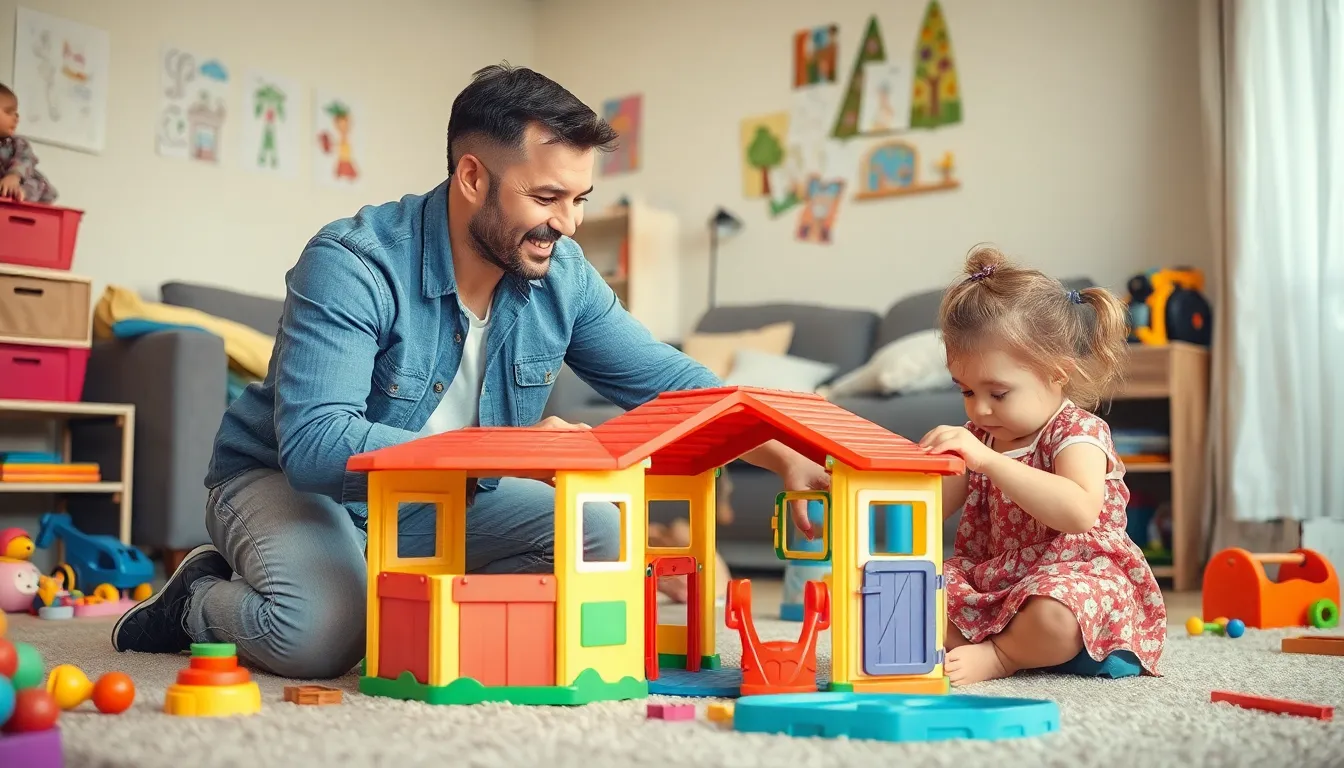Being a solo parent can feel like juggling flaming torches while riding a unicycle. With a never-ending to-do list and little time to breathe, setting goals might seem like a luxury rather than a necessity. But what if he could turn that chaos into clarity? Goal setting isn’t just for corporate bigwigs; it’s a game-changer for solo parents too.
Imagine transforming daily chaos into a well-orchestrated symphony. By setting clear, achievable goals, he can not only streamline his life but also create a roadmap for success that benefits both him and his kids. It’s time to swap the overwhelming stress for a structured plan that keeps everyone on track—without losing his sanity in the process. Let’s dive into the art of goal setting and discover how it can empower solo parents to thrive, not just survive.
Table of Contents
ToggleThe Importance of Goal Setting as a Solo Parent
Establishing goals is essential for solo parents navigating daily challenges. Clarity emerges from well-defined objectives, allowing parents to prioritize tasks effectively. Routine benefits from structured goals, which can reduce stress and enhance time management.
Achieving balance often feels difficult without clear intentions. Focus on personal and family goals helps in creating a harmonious environment. For example, setting short-term goals, like preparing healthy meals, contributes to overall family well-being.
Motivation increases when solo parents recognize their progress. A sense of achievement reinforces positive behaviors and encourages continued commitment. Celebrating small victories plays a crucial role in maintaining momentum.
Accountability emerges naturally through goal setting. Solo parents often build support networks, which foster encouragement from friends and family. Sharing goals not only provides external motivation but also strengthens relationships.
Resource allocation aligns with effective goal setting. Identifying specific needs, such as financial stability or educational support, helps solo parents utilize available resources efficiently. Prioritizing these areas leads to tangible improvements in family life.
Lastly, resilience strengthens through the practice of goal setting. Challenges will arise, yet goals provide a framework for addressing obstacles. With a clear vision, solo parents can adapt and overcome difficulties, ensuring a brighter future for themselves and their children.
Understanding the Challenges
Solo parents face unique challenges while juggling their responsibilities. Time management and emotional strain frequently emerge as significant obstacles.
Time Management
Managing time effectively proves crucial for solo parents. They must balance work commitments with household duties and childcare. Daily routines often require detailed planning to ensure tasks get completed. Establishing priorities simplifies this process, enabling solo parents to focus on what matters most. Using tools like calendars or apps assists in staying organized. Allocating specific time slots for activities such as work, homework, and family time enhances overall productivity. Identifying peak hours for focus helps maximize efficiency. Making small adjustments in daily schedules leads to more manageable routines. Moreover, incorporating time for self-care ultimately benefits both the parent and child.
Emotional Strain
Emotional strain weighs heavily on solo parents. They frequently experience feelings of loneliness, frustration, and overwhelm. Balancing parenting, work, and personal life causes significant stress. Setting achievable goals reduces anxiety by providing clarity and a sense of purpose. Accessing support networks, like friends or family, creates a sense of connection, making challenges less daunting. Engaging in open conversations about feelings fosters emotional resilience. Recognizing personal limits helps parents prevent burnout. Celebrating small achievements boosts morale and reinforces a positive mindset. Connecting with others in similar situations encourages sharing of resources and strategies, easing the emotional burden.
Effective Goal Setting Strategies
Effective strategies enhance goal setting for solo parents. Utilizing structured techniques helps achieve both personal and family objectives.
SMART Goals Framework
SMART stands for Specific, Measurable, Achievable, Relevant, and Time-bound. Setting goals that meet these criteria ensures clarity. A specific goal defines exactly what needs to be accomplished, such as improving quality time with children. Measurable goals allow parents to track progress, like spending at least two hours a week on family activities. Achievable goals remain realistic to foster motivation while pushing for growth. Relevant goals directly relate to individual circumstances, ensuring alignment with personal values. Finally, time-bound goals create a sense of urgency, establishing deadlines for milestones, which maintains focus and commitment.
Short-Term vs. Long-Term Goals
Short-term goals focus on immediate actions that lead to larger achievements. Parents can prioritize daily or weekly tasks, such as organizing a family dinner or completing a specific project. These small milestones provide immediate gratification and a sense of accomplishment. Long-term goals, on the other hand, encompass overarching aspirations, like saving for a family vacation or planning for children’s education. These goals require sustained effort and ongoing reassessment. Balancing both types of goals enables solo parents to maintain motivation while making steady progress toward significant life changes. Both strategies contribute to a structured approach, making challenges more manageable.
Creating a Support System
Building a strong support system is crucial for solo parents. Effective networks can provide the encouragement needed to achieve goals and handle daily challenges.
Seeking Help from Family and Friends
Family members and friends form the backbone of a support system. They can offer emotional support and practical assistance, such as babysitting or sharing responsibilities. Sharing goals with these close connections fosters accountability, enhancing motivation. Those who provide encouragement often help reduce feelings of isolation. Encouragement might come from conversations about personal challenges or celebrations of small victories. Reaching out can be as simple as setting up regular check-ins or planning group activities. Engaging loved ones creates a sense of community and shared responsibility.
Utilizing Community Resources
Community resources can offer additional support for solo parents. Local organizations often provide parenting groups, workshops, and counseling services tailored to individual needs. Finding such programs enables solo parents to connect with others facing similar challenges. Schools frequently offer resources for parents, including family events and educational workshops. Utilizing these connections can enhance social networks and provide valuable information on local services. Many communities also host online forums and social media groups that promote shared experiences and support. Accessing these resources can lead to finding helpful tools and encouragement in the journey of parenting.
Staying Motivated and Accountable
Maintaining motivation and accountability is crucial for solo parents striving to achieve their goals. Engaging with strategies to track progress and celebrate achievements proves essential in this journey.
Tracking Progress
Tracking progress keeps solo parents aware of their advancements. Using tools such as journals, apps, or checklists can help visualize milestones. Regular reviews of goals ensure that adjustments can be made when necessary. Reflection on completed tasks reinforces commitment to goals. Creating a simple progress tracker fosters clarity and provides motivation to continue. This practice not only demonstrates how far they’ve come but also highlights areas that may need realignment. Consistently monitoring this progress establishes a sense of accomplishment and encourages perseverance.
Celebrating Achievements
Celebrating achievements, no matter how small, boosts morale significantly. Recognizing these victories cultivates a positive mindset, making the journey enjoyable. Solo parents can reward themselves in various ways, such as a treat, a day off, or sharing successes with friends and family. These celebrations reinforce motivation, building a supportive environment. Acknowledging accomplishments also strengthens the drive to pursue further goals. By focusing on the happiness that comes with achieving objectives, solo parents maintain momentum and commitment to their aspirations.
Conclusion
Embracing goal setting can transform the journey of solo parenting. By establishing clear objectives and leveraging support networks, solo parents can navigate their daily challenges more effectively. This structured approach not only enhances time management but also fosters emotional resilience.
Celebrating small victories along the way boosts motivation and reinforces positive habits. As solo parents prioritize their needs and those of their children, they create a balanced environment that promotes growth and well-being. With the right goals in place, they can thrive in their unique parenting journey, turning obstacles into opportunities for success.







